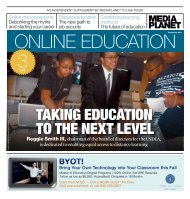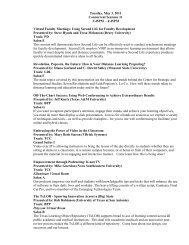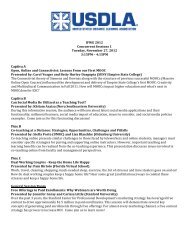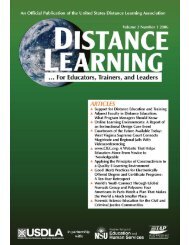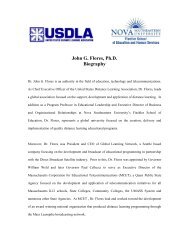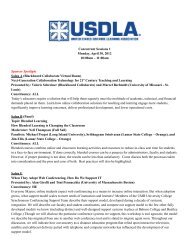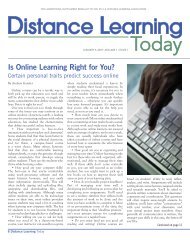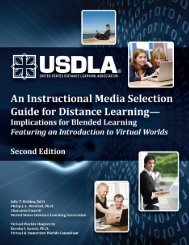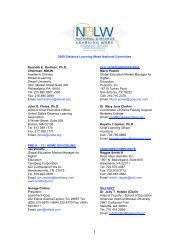United States Distance Learning Association
United States Distance Learning Association
United States Distance Learning Association
- No tags were found...
Create successful ePaper yourself
Turn your PDF publications into a flip-book with our unique Google optimized e-Paper software.
and this is significant, the Corps has had<br />
the patience to allow us to build. We’ve<br />
been building this … for three years now.<br />
We have done a little bit of validation, and<br />
we will start full up this coming October.<br />
Our school year goes October to June.<br />
And our program is a two year construct.<br />
Because they allowed us that patience, we<br />
have really focused in the most important<br />
part, and that is building the courseware<br />
that matches this, and more importantly, a<br />
faculty development program so our<br />
instructors can lead seminars and not sit<br />
there and try to lecture, which is key.<br />
LIMITATIONS OF<br />
DISTANCE EDUCATION<br />
PROMMASIT: You acknowledge that<br />
there are limitations to a distance course,<br />
and that the Marine Corps also understands<br />
that and does not expect it to be<br />
equal. That’s significant. Quite often people<br />
think the results should be exactly the<br />
same.There has to be some understanding<br />
that it is a different environment.<br />
VAN ZUMMEREN: You’re exactly<br />
right. What we do is we sit down with the<br />
Marine Corps University and the colleges<br />
specifically, and we say, “All right, list your<br />
core competencies, the outcomes, the<br />
expectations of the graduates, and they do.<br />
Then we sit down and honestly say, “Can<br />
we meet some of it or all of it Based on<br />
that, what are the learning objectives that<br />
support that How do you get to those<br />
outcomes”<br />
We really home in on what’s most critical.<br />
The seminar experience allows us to<br />
hone in on leadership, writing, and speaking,<br />
along with the learning outcomes or<br />
objectives of strategic thought.<br />
THE CHALLENGE<br />
PROMMASIT: What has been the biggest<br />
challenge for you so far in the<br />
changeover process<br />
VAN ZUMMEREN: A very loaded<br />
question—the whole thing has been very<br />
challenging. I think dealing with the<br />
unknown. In my graduate studies, I did<br />
two hybrid online courses at George<br />
Mason—hybrid in the sense you took, of a<br />
16-week semester, you took four lessons on<br />
campus and 12 lessons from your home.<br />
They were great learning experiences.<br />
Some of my course directors are online<br />
instructors, or were students of online. So<br />
many of us bring a lot of experience doing<br />
online type stuff. All of us have been<br />
engaged in our nonresident seminar programs.<br />
We bring all that experience.<br />
The biggest change is [the exam].<br />
Because the seminar program, up to today,<br />
has been an option, students still took the<br />
multiple-choice exam, which was the same<br />
exam that the box of books students took.<br />
Everything was really based off of what<br />
that exam was going to be. So the instructors<br />
really ended up teaching the exam.<br />
Not a good way of doing business, but<br />
that’s how it matured.<br />
This changed to a seminar, or to a<br />
Socratic learning method in which the students,<br />
theoretically, are the ones who are<br />
teaching each other, and the instructor is<br />
really a facilitator. That we see as the long<br />
pole in the tent. That is where the challenge<br />
is—to get the seminar leaders to be a<br />
little bit more quiet and to orchestrate or<br />
coordinate the conversations to make sure<br />
that everybody participates. That’s what<br />
we’ve been doing with our faculty development<br />
sessions and practicing for the last<br />
two years. To me, it was, it is, and it’s going<br />
to be always a challenge for us.<br />
CONCLUSION<br />
The changeover process is admittedly a<br />
challenge. The Socratic learning method<br />
forces students to be active in class sessions.<br />
More important than accumulation<br />
of knowledge, the main focus is on teaching<br />
Marine officers how to respond to situations<br />
by applying creative critical-<br />
Volume 4, Issue 4 <strong>Distance</strong> <strong>Learning</strong> 91



